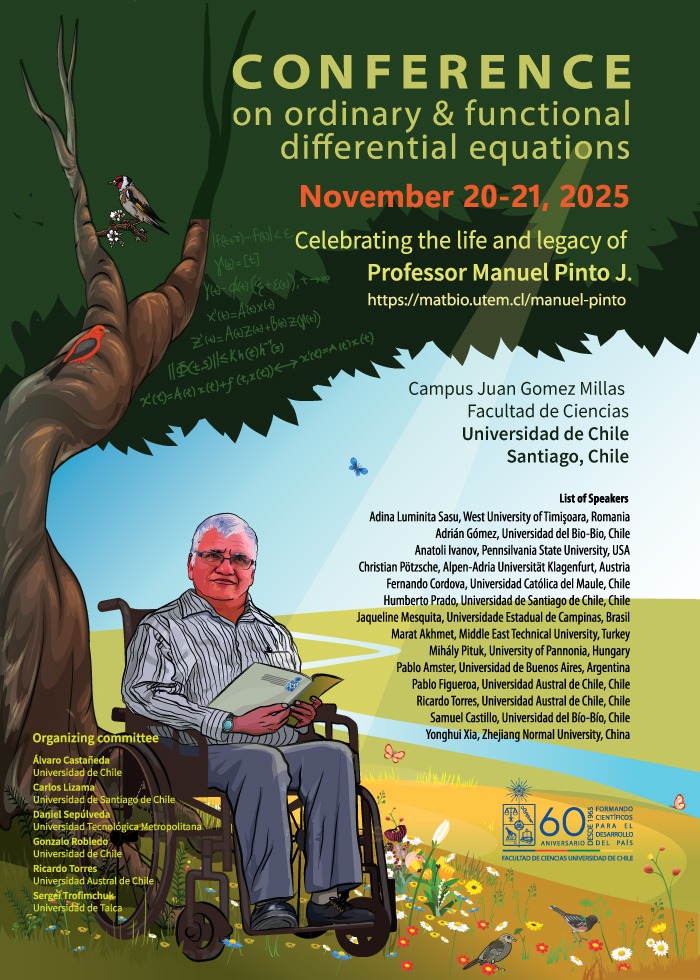Conference on Ordinary & Functional
Differential Equations
Celebrating the life and legacy of Professor Manuel Pinto J.
November 20-21, 2025, Facultad de Ciencias, Universidad de Chile, Chile
The conference will take place at the Facultad de Ciencias de la Universidad de Chile Avenida Las Palmeras 3425, Ñuñoa, Santiago Chile.
You are cordially invited to participate
Registration form
List of Speakers
Exponential Trichotomy via Admissibility: from Nonuniform to Uniform Approaches
Abstract: The trichotomy of variational dynamics is explored via admissibility, in both nonuniform and uniform settings. With this purpose, we consider a general variational system, associate with it a control system that consists of a family of input-output equations and
introduce a general admissibility notion. The aim of this presentation is fourfold: first we show that admissibility implies the nonuniform trichotomy of the original system and in certain conditions its uniform trichotomy. Second, we discuss the additional assumptions under which
admissibility implies even more, namely the exponential trichotomy. Third, we characterize the uniform exponential trichotomy via admissibility properties. Fourth, we discuss applications for
the exponential trichotomy of skew-product flows. Throughout the presentation we give explicit examples that motivate the hypotheses. In the end, we discuss open problems and future applications.
Monotone Heteroclinic Connection in Nicholson’s Model with Harvesting Term and Two Delays
Abstract: We study the existence of monotone heteroclinic solutions in a Nicholson’s blowflies model including a linear harvesting term and two distinct delays,
$$x′(t) = −δx(t) − Hx(t − σ) + ρ x(t − r)e^{−x(t−r)},$$
under the parameter condition $1 <\frac{\rho}{\delta+H}\leq e$
and delay relation $0 < \sigma < r$. We prove the existence of a heteroclinic orbit connecting the equilibria $x_0 = 0$ and $x_κ = \ln(\rho/(\delta + H))$.
The analysis is based on an adaptation of the monotone iteration method of Wu and Zou (2001), originally developed for traveling wave fronts in delayed reaction–diffusion systems, to the case of a functional differential equation with two unequal delays.
The coexistence of two delays introduces additional analytical challenges, particularly in the construction of compatible upper and lower solutions and in verifying the exponential quasimonotonicity condition. We address these difficulties by deriving explicit bounds on the harvesting delay $\sigma$ that ensure the applicability of the monotone iteration scheme.
The proof combines the explicit construction of bounding solutions with a detailed study of the characteristic equation, and the theoretical results are supported by numerical approximations of the heteroclinic orbit obtained through the associated integral iteration scheme.
Dynamics in Some Differential Delay Models From Biological Applications
Abstract: Differential delay equations are frequently used as mathematical models of real-world phenomena where the time-delays are intrinsic features of their functioning. In the past half a century they were particularly useful in adequate modeling of various biological processes, especially in population dynamics and physiology.
We consider a simple form scalar differential delay equation. Its partial cases include several well-known equations such as Mackey-Glass hematopoiesis models (blood cell production) and Nicholson’s model of blowfly populations. Dynamics of solutions in this equation are studied. Sufficient conditions are derived when the unique positive equilibrium is globally asymptotically stable. The stability conditions are given in terms of induced interval maps, one set being delay independent criteria and another one involving the size of delay. The existence of periodic solutions slowly oscillating about the equilibrium is also established. The periodic oscillations in the models always exist when the equilibrium is linearly unstable and there is the negative feedback property about the equilibrium. The proof of existence follows the established ejective fixed point techniques with necessary modifications due to the specific form of the equations.
Evans function, parity and nonautonomous bifurcation
Abstract: This is a joint work with Iacopo Longo (Imperial College, London, UK) and Robert Skiba (Uniwersytet Miko\l{}aja Kopernika w Toruniu, Poland).
We provide an approachable and yet flexible sufficient condition for the bifurcation of bounded entire solutions to nonautonomous ordinary differential equations. This requires to relate the parity, which is a crucial tool in the abstract bifurcation theory of nonlinear Fredholm operators to the Evans function, an established concept for the stability analysis of traveling waves to evolutionary differential equations.
We illustrate that isolated zeros of the Evans function imply that critical spectral intervals of the Sacker-Sell (dichotomy) spectrum split, while sign changes of the Evans function are sufficient for local and global bifurcations of whole continua of bounded entire solutions.
Incorporating differential dynamics for transmission rate in epidemiological models
Abstract: The SIR differential epidemiological model, with constant coefficients, is not an adequate representation for high-risk contagion processes that stimulate behavioral changes in populations. From the perspective of a mechanical theory of contagion, we approach a generalization to the model by adding a dynamic law, reaction-restoration, for the transmission rate.
INTEGRAL TRANSFORMS IN THE ANALYSIS OF PSEUDO-DIFFERENTIAL OPERATORS
Abstract: The aim of this talk is to present a functional calculus for a class of pseudo-differential operators. We establish existence and regularity results for solutions to nonlinear pseudo-differential equations defined by nonlocal operators. Furthermore, we discuss applications of the theory to equations of physical relevance, particularly those involving the fractional Laplace operator.
General concept of periodicity on time scales
Abstract: In this talk, I will present a general concept of periodicity on time scales and some applications. This is a joint work with M. Bohner and S. Streipert.
The uncertainty principle for chaos.
Abstract: W. Heisenberg developed the famous uncertainty principle, which has profoundly impacted various fields, including science, industry, and social life. In our work on chaos research, we propose an uncertainty principle specifically for chaos, focusing
on two key characteristics: alpha unpredictability and Lorenz sensitivity. This principle establishes a limitation on the relationship between two infinite sequences that underlie these concepts. We have announced our formula online in the introduction
of our book, *Ultra Poincaré Chaos and Alpha Unpredictability*, published by IOP in 2024. You can find it at this link: https://iopscience.iop.org/book/mono/978-0-7503-
5162-1/chapter/bk978-0-7503-5162-1ch1.pdf. More developed information can be
found in the International Journal of Applied Physics, On Assess of Uncertainty in Chaos – IARAS, published this year. This principle is helpful to both deterministic and stochastic dynamics, marking a significant advancement in integrating these two
fields. It is a necessary condition for all previously known definitions of deterministic chaos, and they are not complete without the principle. Our initial progress in this area was achieved through research on Markov chains utilizing alpha labeling. Additionally, we propose ways to use this principle to assess the degree of chaos in specific processes. We also highlight open questions regarding the relationships among various types of chaos, including a modification of the recurrence theorem.
Shadowing, Hyers–Ulam stability and hyperbolicity for
nonautonomous linear delay differential equations
Abstract: It is known that hyperbolic nonautonomous linear delay differential equations in finite dimensional spaces are Hyers–Ulam stable and hence shadowable. The converse result is available only in the special case of autonomous and periodic linear delay differential equations with a simple spectrum. In this talk, we show the converse and hence the equivalence of all three notions in the title for a general class of nonautonomous linear delay differential equations with uniformly bounded coefficients. The importance of the boundedness assumption will be shown by an example.
This is a joint work with Professors Lucas Backes (Universidade Federal do Rio Grande do Sul, Porto Alegre, Brazil) and Davor Dragicevic (University of Rijeka, Rijeka, Croatia).
On an abstract inequality of Gronwall-Bellman type
Abstact: The Gronwall–Bellman inequality is ubiquitous in the qualitative theory of differential equations. In this talk we shall introduce an abstract version of the celebrated inequality on a Banach lattice and explore its connections with the maximum principle. Furthermore, we shall deduce the uniqueness and continuous dependence properties for general semilinear equations $Lu=Nu$. In the spirit of Manuel Pinto’s work, possible extensions to nonlinear Bihari-type inequalities will be discussed.
The Poincaré-Perron Problem for Linear Differential Equations: Overview and Recent Advances
Abstract: This talk explores the classical Poincaré-Perron problem, which investigates the asymptotic behavior of solutions to linear differential equations as the independent variable tends to infinity. After reviewing foundational contributions by Poincaré [5] and Perron [4], we present several generalizations and improvements. In particular, we highlight recent advances that refine criteria for asymptotic expansions and provide explicit solution formulas, incorporating modern techniques for handling various types of perturbations, such as $L^p$ -functions and almost periodic functions [3]. Specifically, by using Bell polynomials, we present versions of the Levinson, Hartman-Wintner, and Harris-Lutz type theorems, avoiding the usual diagonalization process. A decomposition property, allow us to analyze asymptotically almost periodic and $p$-almost periodic cases as well. Several examples illustrate the applicability of these results. The talk is based on joint work with Manuel Pinto (UChile) and Harold Bustos (UACh).
Some Advances in the Qualitative Theory of Differential Equations with Generalized Piecewise Constant Argument
Abstract: On this occasion, I will discuss the progress achieved regarding the theory of differential equations with piecewise constant argument. I will also highlight the profound influence that Prof. Manuel Pinto’s legacy has had on the genesis and development of all my research in recent years.
Levinson and Hartman-Wintner Asymptotic Theorems and Consequences
Abstract: We present some results on asymptotic integration which are consequences of classical results results on this issue by N Levinson and Hartman-Witnner. The main idea is to take a system $y′(t) = [A(t) + R(t])y(t)$, where the function $R(t)$ is the perturbation term, and to study the asymptotic behavior (as $t \to \infty$) of a solution $y(t)$ in terms of a solution of a system $x′(t) = A(t)x(t)$.
Some extensions to difference equations, retarded functional differential equations and dynamic equations in time scales will be mentioned; particularly, contributions by Professor Manuel Pinto.
We present some results on asymptotic integration which are consequences of classical asymptotic results results on this issue by N Levinson and Hartman-Wintner.
Exponential dichotomy and global linearization
Abstract: Talk presents some recent advances in the properties of exponential dichotomy (robustness, admissibility, etc.) and its applications to the global linearization. In fact, I have many papers coauthored by Professor Pinto. This report is prepared in memory of our wonderful collaboration.
Organizing Committee:
Álvaro Castañeda, Universidad de Chile.
Carlos Lizama, Universidad de Santiago de Chile.
Daniel Sepúlveda, Universidad Tecnológica Metropolitana.
Gonzalo Robledo, Universidad de Chile.
Ricardo Torres, Universidad Austral de Chile.
Sergei Trofimchuk, Universidad de Talca.
Contact us email: congresohonormanuelpinto@gmail.com

